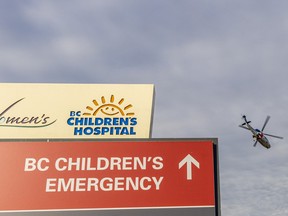Since the start of 2025, some 44 per cent of emergency room visits at B.C. Children’s Hospital were due to respiratory symptoms.

If you’re a parent, you know this time of year well. That’s right: it’s respiratory illness season.
B.C. Children’s Hospital has recorded a steady rise in the number of kids visiting the emergency department in recent weeks, many of them showing symptoms of respiratory illness.
Since the start of the new year, 44 per cent of emergency room visits at the hospital were due to respiratory symptoms. That figure is on par with the period from October to December 2024, when 30 to 50 per cent of emergency room visits at the hospital were due to respiratory illness.
“If your child has an emergency health concern, our team is prepared to provide the best care possible,” said Dr. Garth Meckler, a pediatric physician with the hospital’s emergency department.
“When emergency departments are busy, care providers must focus their attention on children with the most urgent issues first, including those with life-threatening conditions.”
Meckler noted that this means children with less urgent concerns may face a longer wait, and encouraged those caregivers to seek care from a family doctor, a walk-in clinic or an urgent and primary care centre.
If your child is experiencing difficulty breathing, visit the emergency room or an urgent and primary care centre.
Children who are struggling to breathe require immediate medical attention and should visit their closest emergency department. Families can also call 911 for ambulance services as needed.
Before leaving for the emergency room, take a few minutes to pack snacks, drinks, toys and books, and any other items needed to keep your child calm and to soothe them. A change of clothing for your child or yourself, as well as phone charger are also recommended.
If your child is dealing with a non-urgent concern, visit a family doctor, a walk-in clinic, an urgent and primary care centre, a pharmacist or call 811.
If your child is dealing with a non-urgent condition, you can call 811 for guidance on how to manage the symptoms at home.
If your child requires treatment for a non-urgent condition, you can take them to visit your family doctor, a walk-in clinic or an urgent and primary care centre.
Pharmacists are also able to help with some non-urgent conditions. In B.C., pharmacists are able to provide care and prescriptions for minor ailments such as pink eye, upset stomachs, sprains and strains, and allergies.
How can I manage respiratory viruses at home or prevent it?
Respiratory viruses such as colds and flus are common among kids in daycare or school. The best protection against serious illness is to ensure your child is vaccinated and up to date on their routine immunizations, including for COVID-19 and influenza.
Ensure your child is practised at washing their hands before eating and encourage them not to touch their face. Remind your child to cough or sneeze into their elbow or a tissue.
Both children and adults who show signs of illness should stay home from school, work and venturing out, particularly if there is a fever, cough, nausea or diarrhea.